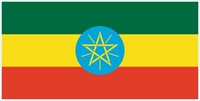Fartoon Siad
 Fartoon Siad is a second-year medical student in the Cumming School of Medicine at the University of Calgary. Prior to medical school, she completed her Bachelor of Science degree in Biological Sciences with an infectious disease focus, and Master’s of Science degree in Population and Public Health, both from the University of Calgary. Her graduate thesis was a mixed-methods evaluation of the gestational diabetes care experience of East African immigrant women in Calgary. She received the prestigious Canadian Institutes of Health Research Frederick Banting and Charles Best Graduate Award to complete her research. Upon completing her graduate degree, Fartoon managed all refugee health projects as a Research Program Manager for the Mosaic Refugee Health Clinic, a novel multidisciplinary clinic that cares for 800 - 1,000 newly arrived refugees per year located in Calgary, Alberta. She also worked as a Research Assistant with the Methods Hub in the Department of Community Health Sciences at the University of Calgary. Her work involved leading a scoping review on identifying ethnocultural and diverse person-centered quality indicators. She has international volunteer experience working as part of the University of Calgary’s East Africa Research Initiative. She provided qualitative research support to students, staff and faculty at the Catholic University of Health and Allied Sciences in Mwanza, Tanzania. She assisted Master of Public Health students in research question and protocol development. In addition, she participated in field trips taken by the Mama na Mtoto project team, a maternal and child health initiative, to document their community health worker program in rural Misungwi, Tanzania.
Fartoon Siad is a second-year medical student in the Cumming School of Medicine at the University of Calgary. Prior to medical school, she completed her Bachelor of Science degree in Biological Sciences with an infectious disease focus, and Master’s of Science degree in Population and Public Health, both from the University of Calgary. Her graduate thesis was a mixed-methods evaluation of the gestational diabetes care experience of East African immigrant women in Calgary. She received the prestigious Canadian Institutes of Health Research Frederick Banting and Charles Best Graduate Award to complete her research. Upon completing her graduate degree, Fartoon managed all refugee health projects as a Research Program Manager for the Mosaic Refugee Health Clinic, a novel multidisciplinary clinic that cares for 800 - 1,000 newly arrived refugees per year located in Calgary, Alberta. She also worked as a Research Assistant with the Methods Hub in the Department of Community Health Sciences at the University of Calgary. Her work involved leading a scoping review on identifying ethnocultural and diverse person-centered quality indicators. She has international volunteer experience working as part of the University of Calgary’s East Africa Research Initiative. She provided qualitative research support to students, staff and faculty at the Catholic University of Health and Allied Sciences in Mwanza, Tanzania. She assisted Master of Public Health students in research question and protocol development. In addition, she participated in field trips taken by the Mama na Mtoto project team, a maternal and child health initiative, to document their community health worker program in rural Misungwi, Tanzania.
 |
Project: "The Evaluation of Loop-mediated Isothermal Amplification Method for the Diagnosis of Malaria in Pregnancy and its Contribution to Reduce Mortality and Morbidity Caused by Malaria in Pregnancy in Northwest Ethiopia"
2/16/2019 - 3/16/2019
Ethiopia |
What does the Kean Fellowship mean to you?
Malaria in pregnancy can be subclinical and often results in a high degree of morbidity and mortality of the pregnant mother and the fetus. Early and accurate diagnosis and treatment of subclinical infections will be critical to malaria elimination. Our team will be using a novel rapid diagnostic test to detect infections in people who are asymptomatic and interview mothers regarding their antenatal care experience. This Kean Fellowship provides me with an opportunity to receive hands-on field experience alongside leading global health experts and continue to pursue my interest in tropical medicine and infectious disease research.
What do you anticipate learning?
I hope to better understand the role of point-of-care testing in diagnosis and treatment of malaria in pregnancy and further develop my research skills in clinical studies. My goal is to explore the area of tropical medicine, reproductive infectious disease and maternal health as a future physician and health services researcher.
What interests you about tropical medicine and what problems are you interested in solving?
My interest in tropical medicine began during my undergraduate degree. Working under the guidance of Dr. Lashitew Gedamu, our laboratory focused on leishmaniasis, a chronic disease caused by the parasite Leishmania, affecting more than 500 million people worldwide. The goal was to understand the survival mechanism of the parasite in human macrophages and use molecular probes for diagnostic purposes and vaccine development. The impact of this experience was its ability to sharpen my research scholarship as I learned the processes behind meaningful basic science research that could be used to target therapies for diseases. I collaborated with a dynamic team of researchers from regions touched by leishmaniasis in Calgary and with researchers at the Armauer Hansen Research Institute in Ethiopia. Therefore, this international partnership allowed for knowledge transfer across borders. This experience exposed me to the world of tropical medicine with the worst affected populations being those living in poverty, lacking access to basic resources and adequate sanitation. I hope to continue conducting research in East Africa alongside local communities and researchers in reducing the burden of infectious disease in areas most affected.